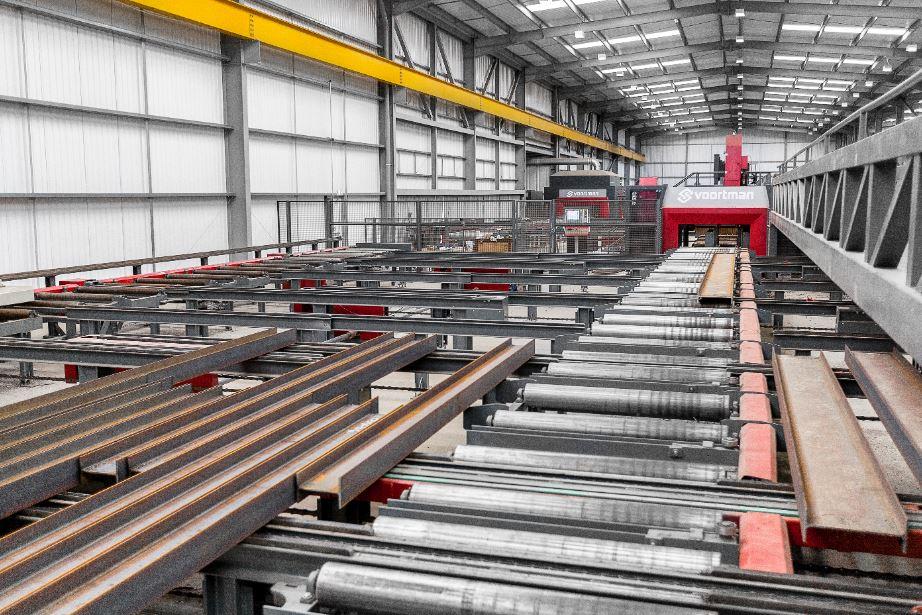The Ultimate Manual on Custom Steel Construction Solutions for Structural Projects
In the realm of architectural projects, the relevance of custom steel construction solutions can not be overemphasized. From the foundational understanding of steel construction essentials to the elaborate procedure of selecting the most ideal materials, every action in this trip plays a critical duty in the ultimate success of a job. As we browse through the complexities of layout considerations, construction procedures, and quality assurance measures, a thorough manual functions as a guiding light for specialists seeking quality in steel manufacture services. Keep tuned to discover the insights that can change the way structural jobs are come close to and implemented.
Understanding Custom Steel Fabrication Basics
Diving right into the principles of personalized steel manufacture gives understanding right into the complex procedure of transforming raw steel into tailored architectural elements. Customized steel construction is a specific manufacturing technique that entails cutting, shaping, and constructing steel products to produce special structures according to specific task requirements. Comprehending the essentials of personalized steel manufacture is vital for making sure the successful execution of architectural jobs.
The process generally starts with the analysis of task requirements and style requirements. This first stage involves thorough preparation and partnership in between developers, engineers, and fabricators to determine one of the most suitable strategy for producing the steel parts. Precision is vital throughout the construction process, as even small variances can impact the architectural integrity of the end product.
Different strategies, such as cutting, welding, and shaping, are utilized to change raw steel into the wanted structural aspects. Competent makers utilize innovative machinery and tools to make certain accuracy and uniformity throughout the manufacture procedure. Quality assurance measures are carried out to confirm the integrity of the made components prior to they are constructed on-site, ensuring conformity with sector standards and job requirements.
Picking the Right Steel Materials

Firstly, the kind of architectural task and its certain needs play a vital function in determining one of the most appropriate steel materials. Elements such as the load-bearing capacity, ecological problems, and preferred lifespan of the structure will certainly determine the grade and sort of steel that ought to be made use of.
Moreover, the physical homes of the steel, including ductility, weldability, and toughness, have to line up with the project's demands to ensure optimal efficiency and durability (steel fixing). Additionally, factors to consider such as rust resistance, cost-effectiveness, and availability of the steel products should likewise be thought about throughout the selection procedure
Design Factors To Consider for Architectural Projects
Architectural projects demand careful focus to create factors to consider to ensure both capability and security are prioritized throughout the construction procedure. When it comes to creating structural tasks, a number of vital elements must be taken into account to ensure the success of the venture. By carefully thinking about these aspects during the style stage, engineers and engineers can make sure the structural job's success from perception to completion.
Improving Manufacture Procedures for Efficiency

Moreover, implementing lean production principles can significantly enhance efficiency in steel construction. By minimizing waste, optimizing operations, and improving interaction in between various teams involved in the construction process, tasks can be finished more promptly and with higher quality standards.
Additionally, developing an efficient manufacturing timetable and operations can aid in focusing on jobs, appointing resources effectively, and meeting job target dates quickly. By home having a clear strategy in position and regularly monitoring development, any type of prospective traffic jams or delays can be recognized and dealt with without delay, guaranteeing effective and smooth construction procedures for structural tasks.
Quality Assurance and Job Management in Steel Fabrication
To make sure the successful execution of steel construction projects, meticulous quality assurance actions and efficient project administration methods are vital elements in preserving precision and meeting client assumptions. Quality control in steel fabrication involves rigorous assessments at different stages websites of the construction procedure to verify conformity with task specs and market requirements. This consists of material testing, dimensional checks, and weld inspections to make certain structural stability and security.
Job management plays an important duty in collaborating the various facets of steel fabrication tasks, such as organizing, source allotment, and interaction among staff member. A well-defined task plan with clear explanation objectives, turning points, and timelines assists to check progress and deal with any kind of prospective issues proactively. Reliable interaction between all stakeholders, including customers, producers, professionals, and designers, is vital for guaranteeing that the job advances efficiently and satisfies the preferred high quality requirements.
Verdict
In verdict, custom-made steel construction plays a critical function in structural jobs by offering tailored remedies using the ideal products and design factors to consider. Effectiveness in fabrication procedures, quality assurance, and effective job monitoring are important for effective results. By recognizing the fundamentals of custom steel manufacture and executing streamlined processes, task teams can deliver top quality and long lasting frameworks that satisfy the specific demands of their customers.
Customized steel construction is a customized production strategy that involves cutting, shaping, and assembling steel materials to create unique frameworks according to details job requirements.To guarantee the successful execution of steel construction tasks, meticulous high quality control procedures and reliable job monitoring techniques are important parts in preserving accuracy and meeting customer assumptions. Quality control in steel construction includes rigorous assessments at different stages of the construction procedure to verify compliance with job specifications and market criteria (steel fabricators melbourne).Job management plays a critical duty in coordinating the numerous elements of steel construction projects, such as scheduling, source allotment, and communication amongst team members.In conclusion, custom steel manufacture plays a critical duty in architectural projects by providing tailored services utilizing the appropriate materials and design factors to consider